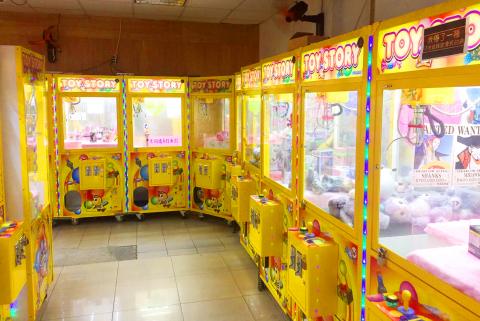Taoyuan City Councilor Liu Mao-chun (劉茂群) on Friday claimed to speak for local parents at a municipal session, saying they were concerned about the rising number of toy claw crane machines around schools, where children were “spending their breakfast money.”
Liu, a member of the Chinese Nationalist Party (KMT), said she received complaints from parents in her electoral district of Bade (八德).
Claw machine stores had appeared near the Da Cheng, Juifong and Guangsing elementary schools, as well as Yongfong Junior High School, causing children to spend their breakfast money and go to school hungry, Liu said.

Photo: Hsieh Wu-hsiung, Taipei Times
A resident in her constituency had told her that his wife had spent NT$6,000, half the family’s monthly allotment for food purchases, on the machines within a few days, Liu said.
Taoyuan Mayor Cheng Wen-tsan (鄭文燦) promised to investigate tax records and commercial license registrations for all claw machine stores near the schools.
Just like vending machine operators, owners of claw machines only need to apply for commercial registration, Cheng said.
Claw machines are defined as “selective vending machines,” as they must guarantee a certain success ratio, Taoyuan Economic Development Bureau Director Chu Sung-wei (朱松偉) said, citing the Statute Regulating Arcades and Gaming Facilities (電子遊戲場管理條例).
The machines’ categorization affords them the same treatment as common vending machines, which only require license registration, Chu said.
The sudden increase in claw machines nationwide has also been a source of discussion online, including on the popular Professional Technology Temple (PTT) electronic bulletin board.
Some netizens speculated that the sudden flood of claw machine stores was because the stores could not be rented out for other purposes.
They speculated that property owners might be frustrated by interest in their buildings and accept offers from claw machine companies, whose business does not require constant staff supervision.
Others said that the appearance of claw machines — which offer simple entertainment at a very low price — is indicative of an economy in recession and should be considered a warning sign.
While people think it is a business trend, it is only a fad hiding the more worrying problem that store locations cannot be rented out, commentators on PTT said.

A preclearance service to facilitate entry for people traveling to select airports in Japan would be available from Thursday next week to Feb. 25 at Taiwan Taoyuan International Airport, Taoyuan International Airport Corp (TIAC) said on Tuesday. The service was first made available to Taiwanese travelers throughout the winter vacation of 2024 and during the Lunar New Year holiday. In addition to flights to the Japanese cities of Hakodate, Asahikawa, Akita, Sendai, Niigata, Okayama, Takamatsu, Kumamoto and Kagoshima, the service would be available to travelers to Kobe and Oita. The service can be accessed by passengers of 15 flight routes operated by

Chinese spouse and influencer Guan Guan’s (關關) residency permit has been revoked for repeatedly posting pro-China videos that threaten national security, the National Immigration Agency confirmed today. Guan Guan has said many controversial statements in her videos posted to Douyin (抖音), including “the red flag will soon be painted all over Taiwan” and “Taiwan is an inseparable part of China,” and expressing hope for expedited reunification. The agency last year received multiple reports alleging that Guan Guan had advocated for armed reunification. After verifying the reports, the agency last month issued a notice requiring her to appear and explain her actions. Guan

GIVE AND TAKE: Blood demand continues to rise each year, while fewer young donors are available due to the nation’s falling birthrate, a doctor said Blood donors can redeem points earned from donations to obtain limited edition Formosan black bear travel mugs, the Kaohsiung Blood Center said yesterday, as it announced a goal of stocking 20,000 units of blood prior to the Lunar New Year. The last month of the lunar year is National Blood Donation Month, when local centers seek to stockpile blood for use during the Lunar New Year holiday. The blood demand in southern Taiwan — including Tainan and Kaohsiung, as well as Chiayi, Pingtung, Penghu and Taitung counties — is about 2,000 units per day, the center said. The donation campaign aims to boost

The Central Weather Administration (CWA) said a magnitude 4.9 earthquake that struck off the coast of eastern Taiwan yesterday was an independent event and part of a stress-adjustment process. The earthquake occurred at 4:47pm, with its epicenter at sea about 45.4km south of Yilan County Hall at a depth of 5.9km, the CWA said. The quake's intensity, which gauges the actual effects of a temblor, was highest in several townships in Yilan and neighboring Hualien County, where it measured 4 on Taiwan's seven-tier intensity scale, the CWA said. Lin Po-yu (林柏佑), a division chief at the CWA's Seismological Center, told a news conference